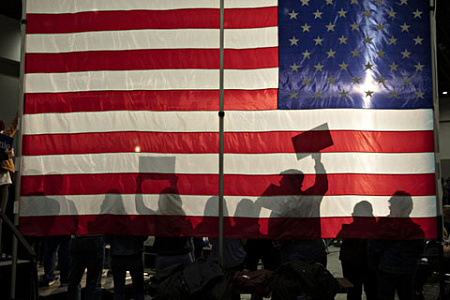
American Politicians Get Tangled Up in Countries and Presidents
In the run up to the presidential primaries, there was a forum for the Democratic presidential candidates in Nevada, during which the candidates’ knowledge of several international issues was tested. Only one of them could name the president of Mexico. (The rest answered in very similar, ingeniously simple ways, saying, when I become the president of the United States, I’ll certainly meet him.) And just three were able to locate the state of Israel – the Americans’ main ally in the Middle East – on a map.
Moreover, during the primaries that have already taken place, only 2% of those intending to vote said that they were worried about the presidential candidates’ competency when it comes to international relations. “What does it matter where Israel is and who the leader of Mexico is?” Meg Tyler from Las Vegas candidly explained. “The main thing is that this person works on our own economy so that my medical expenses go down, and so that they can somehow solve the problem with undocumented immigrants from Latin America.”*
Incidentally, in response to the accusation that those Democratic presidential candidates are “ignorant” and that they lack elementary school knowledge (and, you know, the U.S. president, in addition to a domestic agenda, has to deal with the most important international matters on a daily basis), the current presidential candidates snapped back in unison: So, President Donald Trump is a great specialist in international affairs, is he? Or did he have some kind of experience before he entered the White House? Or perhaps he worked somewhere as an ambassador or a senior government official in the State Department or CIA?
And this is where there’s a slight discrepancy. On the one hand, the vast majority of American voters are in no way worried about the knowledge or complete ignorance of their presidential candidates in relation to matters of international politics. On the other hand, it’s worth discovering that their candidates are, to put it mildly, weakly informed about even the most minimal of things concerning U.S. foreign policy (after all, these days, the president of the United States is the most influential figure in the world when it comes to international issues), and this is why this prompted general outrage. And just who are we electing if that person does not even know the name of the president of Mexico, a neighboring country and Washington’s third largest partner in terms of the volume of bilateral trade?
To me, this isn’t just a pressing topic for America, but also for the many other countries where the most senior government officials have made it into their posts mainly through elections among their compatriots, or by inheriting power from their parents (or predecessors). They have certainly not won any kind of geography quiz and, even when holding the highest political positions, they are completely ignorant of many key international problems, yet try not to show this publicly.
As far as America is concerned, for example, key international agreements, laws concerning other countries, the introduction of sanctions against “enemies of the U.S.” and the like, are not passed by the president of the country, but by Congress, where, at the moment, only every fourth legislator has a passport. And those who do perhaps have some international experience are, as a rule, former military personnel who were either in Iraq or Afghanistan as part of the U.S. Armed candidates are, to put it mildly, weakly informed about even the most minimal of things concerning U.S. foreign policy (after all, these days, the president of the United States is the most influential figure in the world when it comes to international issues), and this is why this prompted general outrage. And just who are we electing if that person does not even know the name of the president of Mexico, a neighboring country and Washington’s third largest partner in terms of the volume of bilateral trade. Naturally, during a vote, let’s say, for sanctions against North Korea and Iran, or for funding a battle with Russia against its “meddling in the American elections,” their decision corresponds to their international experience.
It’s for this reason that in the U.S., and in a whole row of other leading countries, advisers and aides play the main role in the informing legislators and presidential candidates about international issues. But all of these people (at least, according to my observations from a quarter of a century of working in the U.S.) uphold strictly established doctrines and stereotypes, which are accepted by the ruling political elite. It is precisely because of this that not one American politician is permitted to look at any important international problem (take relations with Russia, for example) from a position that is contrary to the generally accepted stance of this same ruling elite.
And if Russia, Iran, North Korea, Cuba and now China, are described as the enemies of America, not one of the presidential candidates, the president, the legislators or the senators can say anything that opposes this; they aren’t even allowed to make a suggestion. And their advisers and aides, who set the “mandatory” understanding of international affairs for the ruling circles of the U.S. are just the same. Graduates of any American university receive a very strict and clear idea about who is “for” America and who is not so much. The roles of the enemy, the ally, the revisionists, and the “threats to the United States” from abroad, have all been drawn up in advance.
In this sense, a presidential candidate might, of course, take an interest in some other points of view on this or that international problem, in addition to the knowledge and guidelines provided by their closest team. They might take an interest in reading economic or social reports not just for their own development, but to personally try and assess the world surrounding America more widely and on a bigger scale. But they also might not be interested. Therefore, knowing the name of the president of Mexico, will, if you’re lucky, earn you some praise among journalists from the local Spanish-language media. Whereas the ordinary non-Spanish speaking voters from the heartlands might say something like, “Look, they’re acting smart aren’t they!” and then not support this “expert in international relations” in the election.
It’s interesting that, since the end of the Vietnam War, questions of foreign policy and even low-level knowledge of international relations haven’t just become a third-tier issue for voters in the U.S., but they are also hardly being discussed during the presidential primaries. Moreover, this also applies to the youth and those who have some experience in communicating with the world outside of the U.S. Therefore, when the new (or the old) U.S. president is inaugurated, that president will turn to aides and advisers if he needs to know something about Mexico or Israel. Or maybe he won’t – he might choose to do it his own way.
At the end of the day, it’s not the Mexicans or the Israelis who will be choosing the president (though this is still up in the air for America). And what Mexicans or Israelis are called in the U.S. and where they are on the map will get sorted in the process of dealing with these and other similar international issues.
*Editor’s note: Although accurately translated, this quoted remark could not be independently verified.


